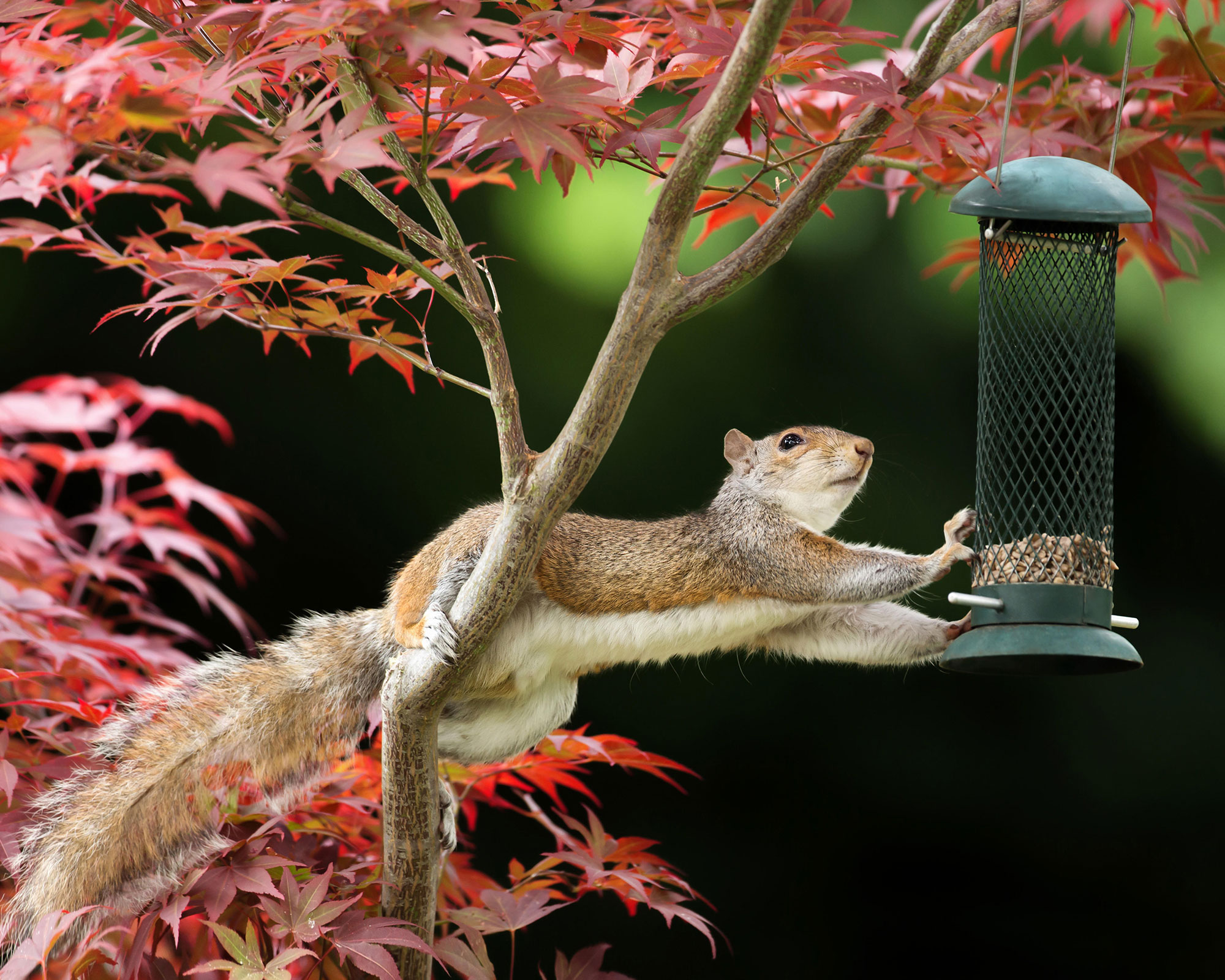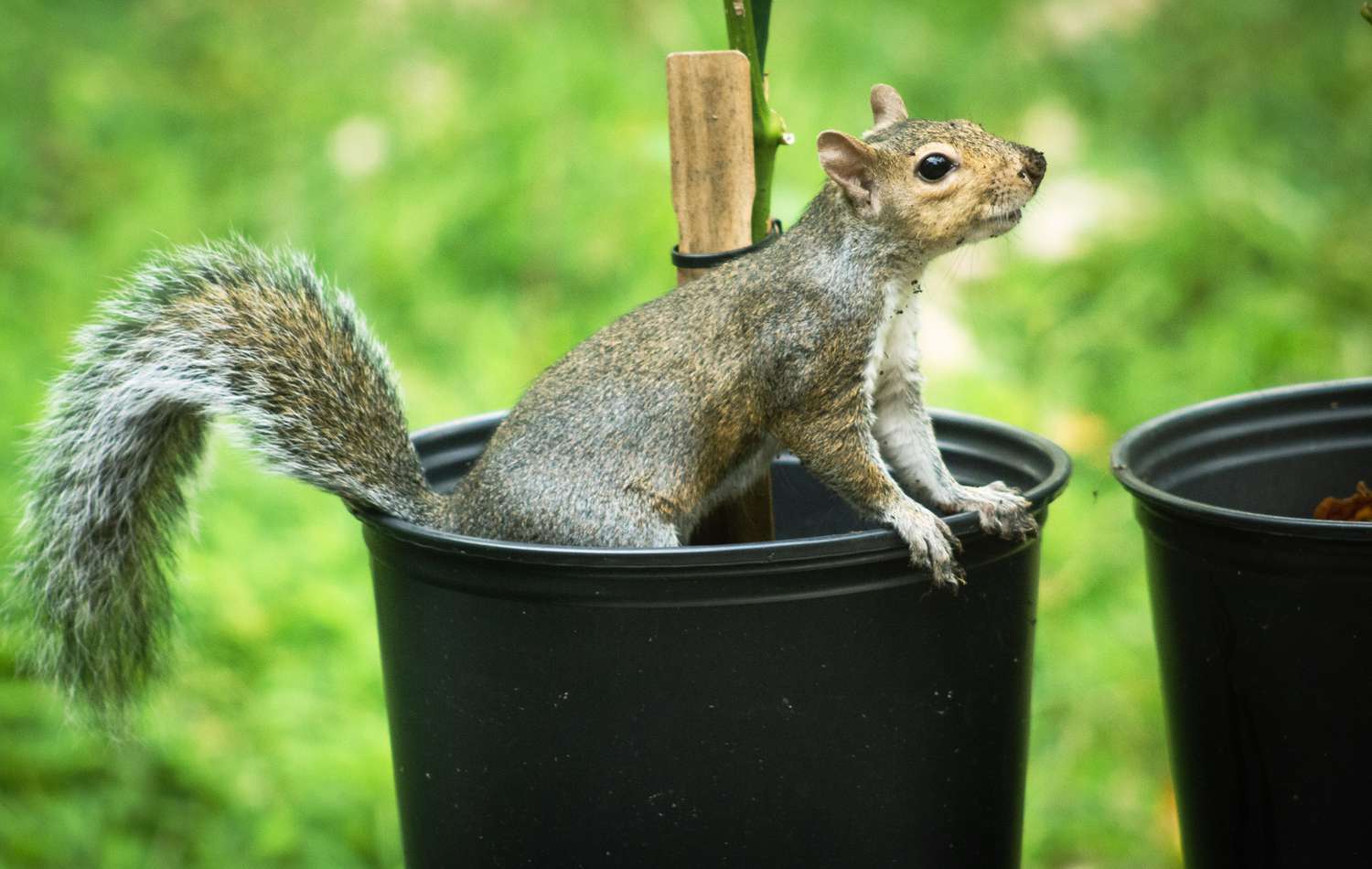
How to Keep Squirrels Out of Flower Pots: Protecting Your Plants from Unwanted Guests
Squirrels are a common sight in backyards, flitting through trees and burying nuts. They might chase each other playfully, but for gardeners, these adorable creatures can become a real headache.
While their antics can be entertaining, squirrels love to dig and forage. This can quickly turn your carefully cultivated flower beds into a disaster zone. Imagine uprooted plants, scattered seeds, and frustrated gardeners left picking up the pieces.
If you’ve found yourself battling these persistent pests, don’t despair! This comprehensive guide will equip you with the knowledge and tools to fight back.

Understanding Squirrels’ Behavior: Decoding Their Motives
To effectively deter squirrels from your flower pots, it’s essential to understand their motivations and behaviors. Squirrels are omnivorous creatures, consuming a diverse range of food sources, including nuts, seeds, fruits, and insects. Their keen sense of smell leads them to buried treasures, and the seeds and bulbs you’ve carefully planted in your flower pots can easily catch their attention as potential food caches.
Digging is a natural behavior for squirrels, as they bury food for later consumption. Unfortunately, your flower pots may appear as ideal locations for these hidden stashes. Squirrels are also territorial creatures, and your flower pots may be seen as part of their territory, prompting them to mark and defend them as their own.
Preventative Measures: Protecting Your Plants from the Start
Prevention is always the best approach when dealing with potential pests, and there are several effective measures you can take to discourage squirrels from approaching your flower pots in the first place.
-
Covering the Soil: Employ physical barriers to deter squirrels from digging in your flower pots. Chicken wire, hardware cloth, or plastic mesh placed over the soil surface can effectively block their access and protect your plants from disturbance.
-
Planting Thorny Plants: Surround your flower pots with plants that have thorns or prickly stems, such as roses, barberry bushes, or holly. These natural deterrents can discourage squirrels from approaching, as they don’t appreciate the discomfort caused by the thorns.
-
Using Strong-Smelling Substances: Squirrels have a sensitive sense of smell, and certain strong odors can repel them. Sprinkle cayenne pepper, garlic powder, or predator urine around your flower pots to create an unpleasant environment for squirrels. These substances emit scents that squirrels find offensive, making your flower pots less appealing.
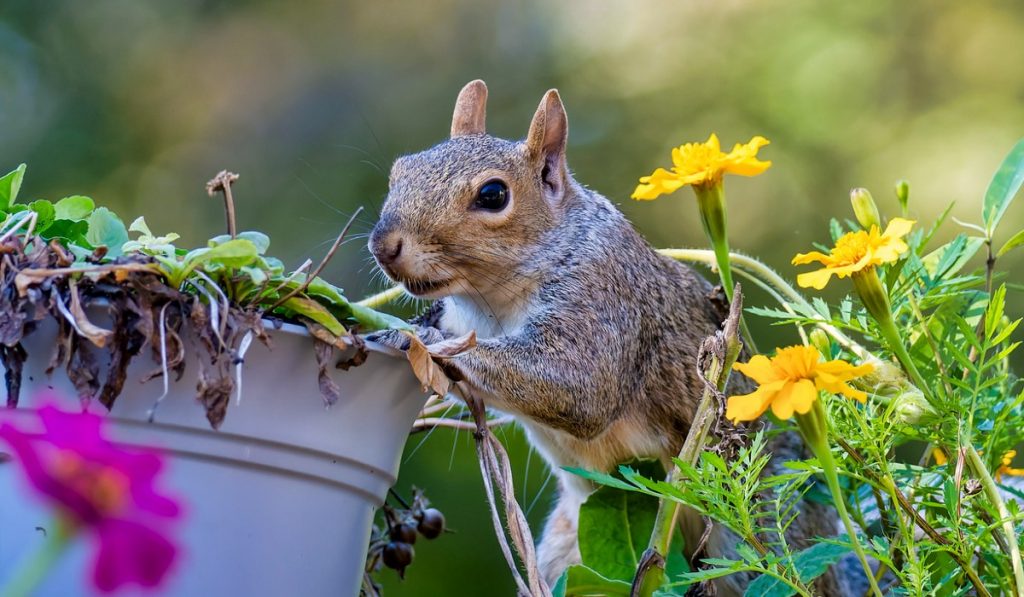
Repellent Solutions: Discouraging Squirrels When Prevention Isn’t Enough
In cases where preventative measures alone are not sufficient, repellents can provide an additional layer of protection for your flower pots. A variety of commercial repellents are available, typically in the form of sprays, granules, or bars. These products often contain ingredients that mimic predator scents or unpleasant tastes, effectively deterring squirrels from approaching.
-
Commercial Repellents: When selecting a commercial repellent, consider the type of plants you have in your flower pots, as some repellents may be harmful to certain plants. Follow the instructions on the product label carefully and apply the repellent regularly, especially after rain or irrigation, as these can wash away the repellent’s effectiveness.
-
Homemade Repellents: If you prefer a more natural approach, you can create your own repellents using ingredients like spicy peppers, garlic, or ammonia. Mix these substances with water and spray them around your flower pots. While homemade repellents may not be as potent as commercial ones, they can still provide a level of deterrence.
-
Motion-Activated Devices: For a more interactive approach, consider using motion-activated sprinklers or noisemakers. These devices emit a sudden burst of water or noise when they detect movement, startling squirrels and discouraging them from approaching your flower pots.
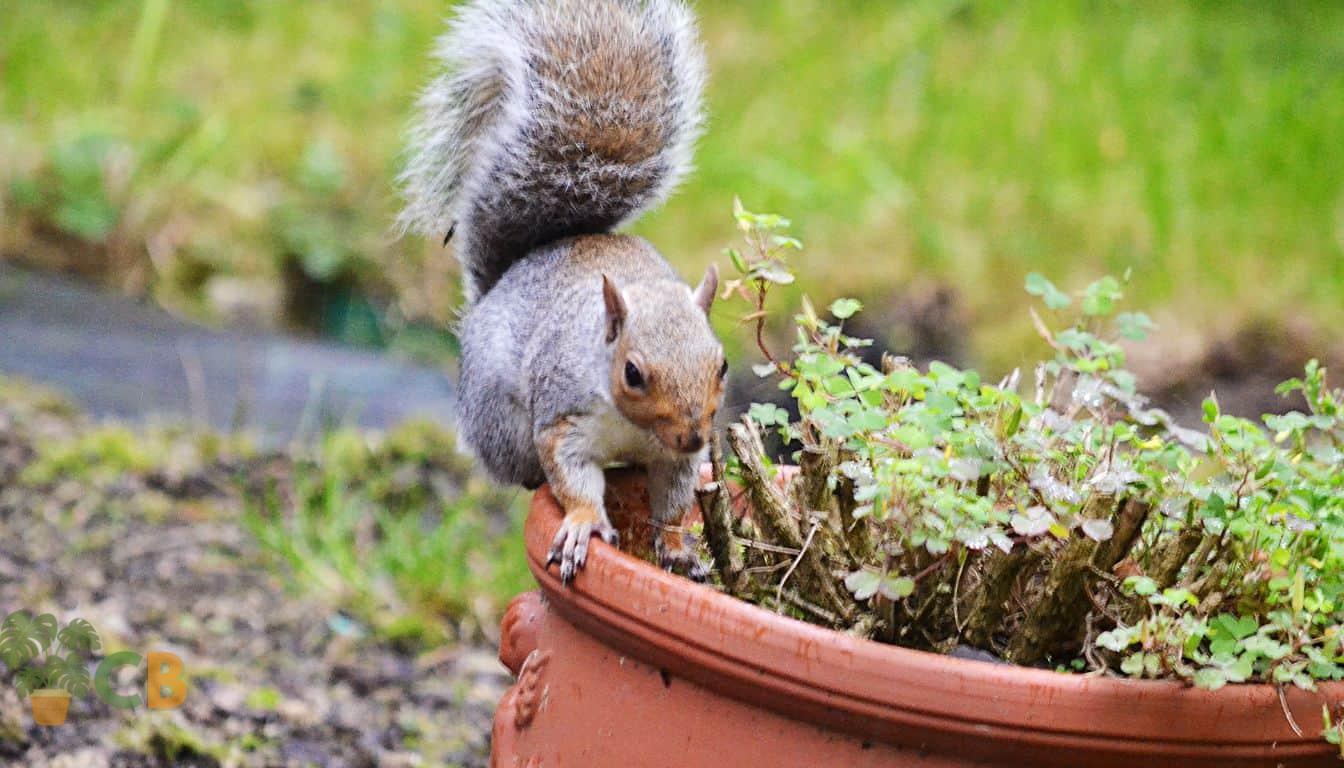
Additional Tips and Considerations: Enhancing Your Squirrel-Proofing Strategy
To further enhance your squirrel-proofing strategy, keep these additional tips in mind:
-
Timing is Crucial: Apply repellents regularly, especially after rain or irrigation, as they may wash away their effectiveness.
-
Rotate Repellents: Alternate between different repellents to prevent squirrels from becoming accustomed to any particular scent or taste. This keeps them guessing and reduces the likelihood of them developing a tolerance to any one repellent.
-
Address Underlying Issues: If squirrels are a persistent problem, consider addressing potential food sources in your yard, such as fallen nuts or unsecured bird feeders. Eliminating these readily available food sources can make your flower pots less attractive to squirrels.
Protecting Your Garden Sanctuary and Enjoying Your Blooms
and a bit of patience. By understanding squirrel behavior, implementing effective strategies, and adapting your approach as needed, you can create a garden sanctuary where your plants can thrive without the interference of these mischievous creatures. Remember, consistency and a proactive approach are key to deterring squirrels and protecting your precious blooms.
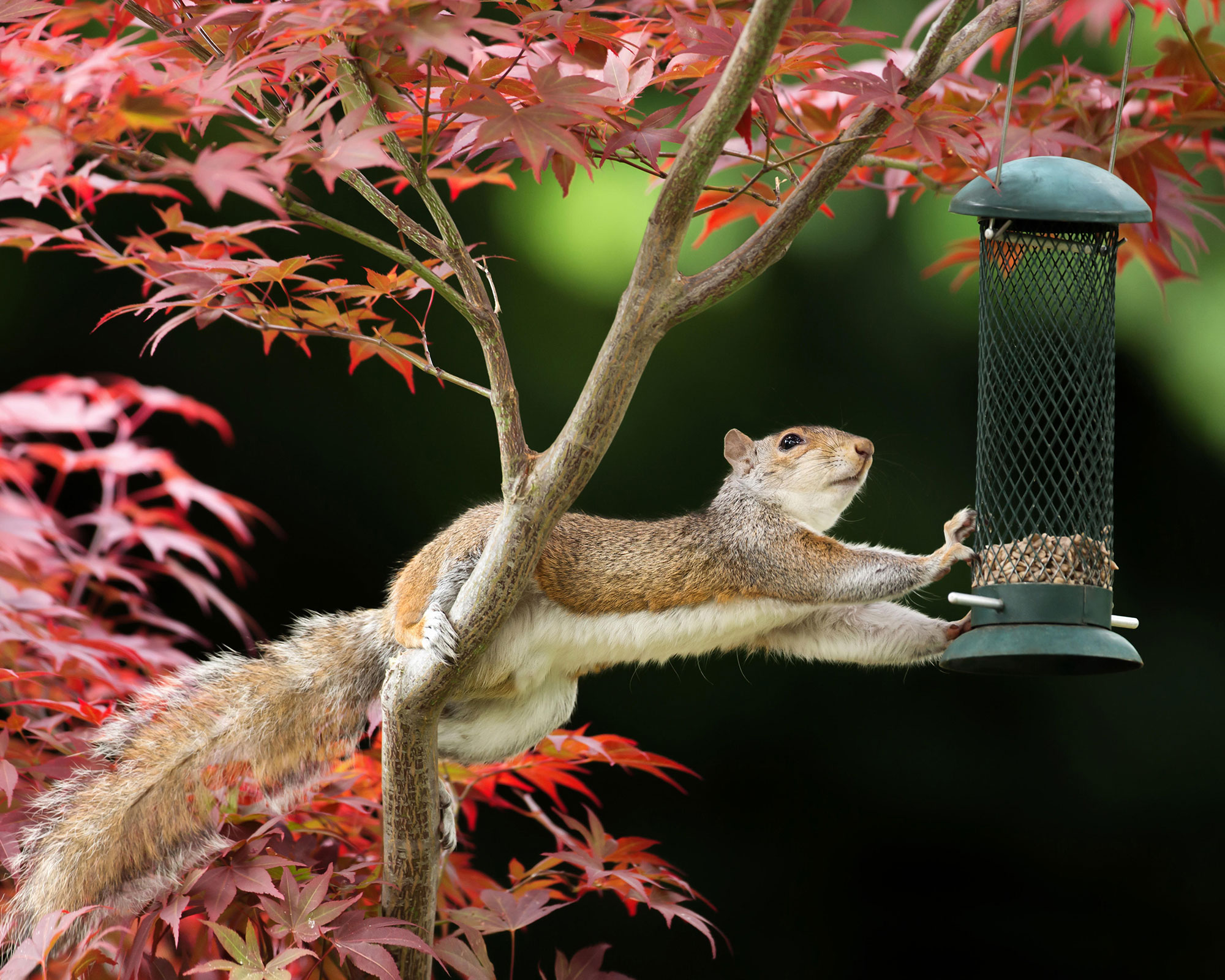
Celebrating Success and Embracing Harmony with Nature
Successfully keeping squirrels out of your flower pots allows you to reap the rewards of your gardening efforts. Witnessing your plants flourish, their vibrant blooms adding a touch of beauty to your outdoor space, can bring immense satisfaction.
However, it’s important to remember that squirrels are a vital part of the natural ecosystem. They play a role in seed dispersal and plant propagation. By employing humane and non-lethal deterrents, you can find a balance between protecting your plants and respecting the role these creatures play in the environment.
Sharing Your Knowledge and Inspiring Others
Gardening is a shared passion for many, and the challenges associated with deterring unwanted pests are common experiences. By sharing your knowledge and successful strategies with fellow gardeners, you can inspire others to create thriving gardens where both plants and wildlife can coexist peacefully.
Document your journey, the methods you used, and the results you achieved. Share your experiences online, in gardening forums, or with your local gardening community. By inspiring others, you can contribute to a collective knowledge base of effective and sustainable solutions for deterring squirrels and protecting gardens.
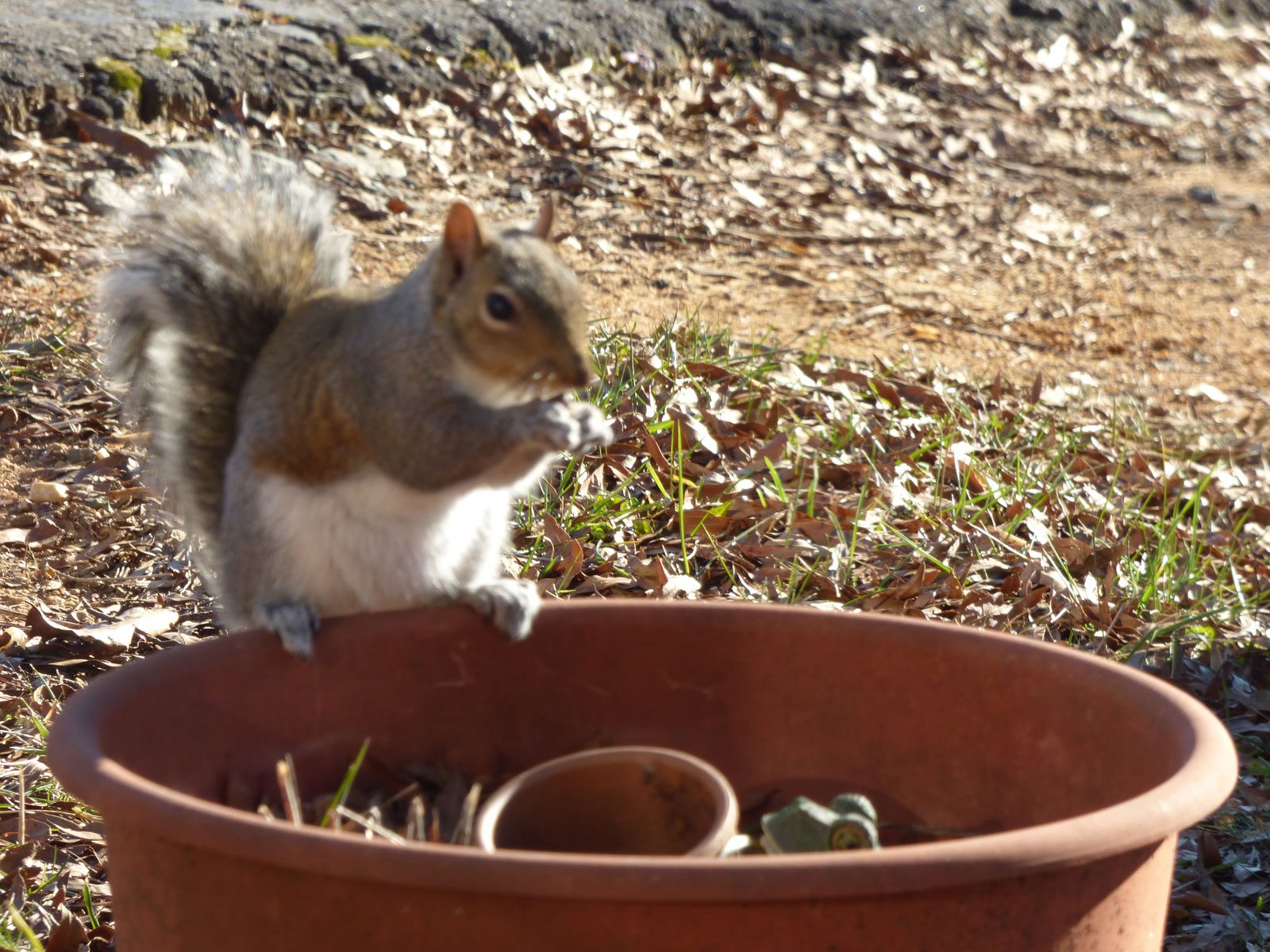
Safeguarding Container Gardens: Effective Squirrel Deterrence Techniques for Ethical and Humane Protection
Implementing Physical Barriers and Exclusion Methods
One effective method for deterring squirrels from accessing potted plants involves the use of protective netting and mesh. These durable materials are draped over pots or secured as barriers around the container garden to prevent squirrel intrusion. Properly installed netting and mesh provide practical and humane protection, ensuring that plants are shielded from potential squirrel damage while allowing for adequate airflow and sunlight. By creating a physical barrier that prevents squirrels from reaching the potted plants, gardeners can effectively mitigate the risk of damage to their container gardens while promoting ethical and humane protection for wildlife.
In addition to netting and mesh, metal guards and enclosures offer another layer of defense against squirrel activity. These sturdy barriers effectively deter squirrels from accessing potted plants, ensuring that containers are securely shielded from potential damage. The durable construction and strategic placement of metal guards and enclosures are essential for safeguarding the integrity of container gardens, providing a reliable and ethical method of protecting plants while respecting the natural behaviors of squirrels.
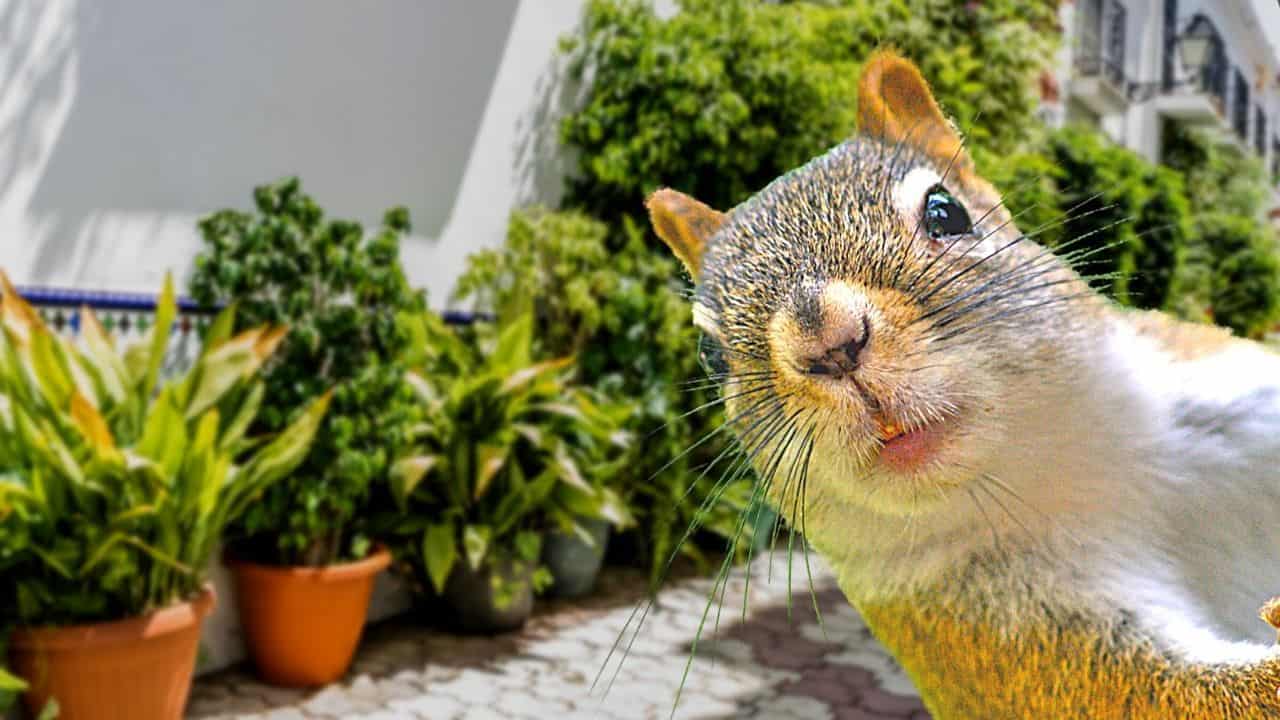
I. Understanding the Impact of Squirrels on Container Gardens
A. Analyzing Squirrel Behavior and Its Effects on Potted Plants
Squirrels, while charming and ubiquitous in outdoor settings, can pose a significant challenge to container gardening. These agile and omnivorous creatures have a propensity to dig and forage, often causing damage to potted plants. From uprooting young plants while searching for food or burying their caches to feeding on tender shoots, flowers, and fruits, squirrels can disrupt the aesthetic and growth of container gardens. Their activities may also lead to soil displacement, causing disarray and undermining the visual appeal of the green space.
B. Recognizing the Importance of Proactive Measures for Safeguarding Container Gardens
Understanding squirrel behavior and the potential damage they can inflict on container gardens underscores the need for proactive measures to protect these cherished green spaces. Recognizing the impact of squirrel activity on the aesthetics and growth of potted plants reinforces the urgency of implementing effective squirrel deterrence techniques to maintain the vitality of container gardens.
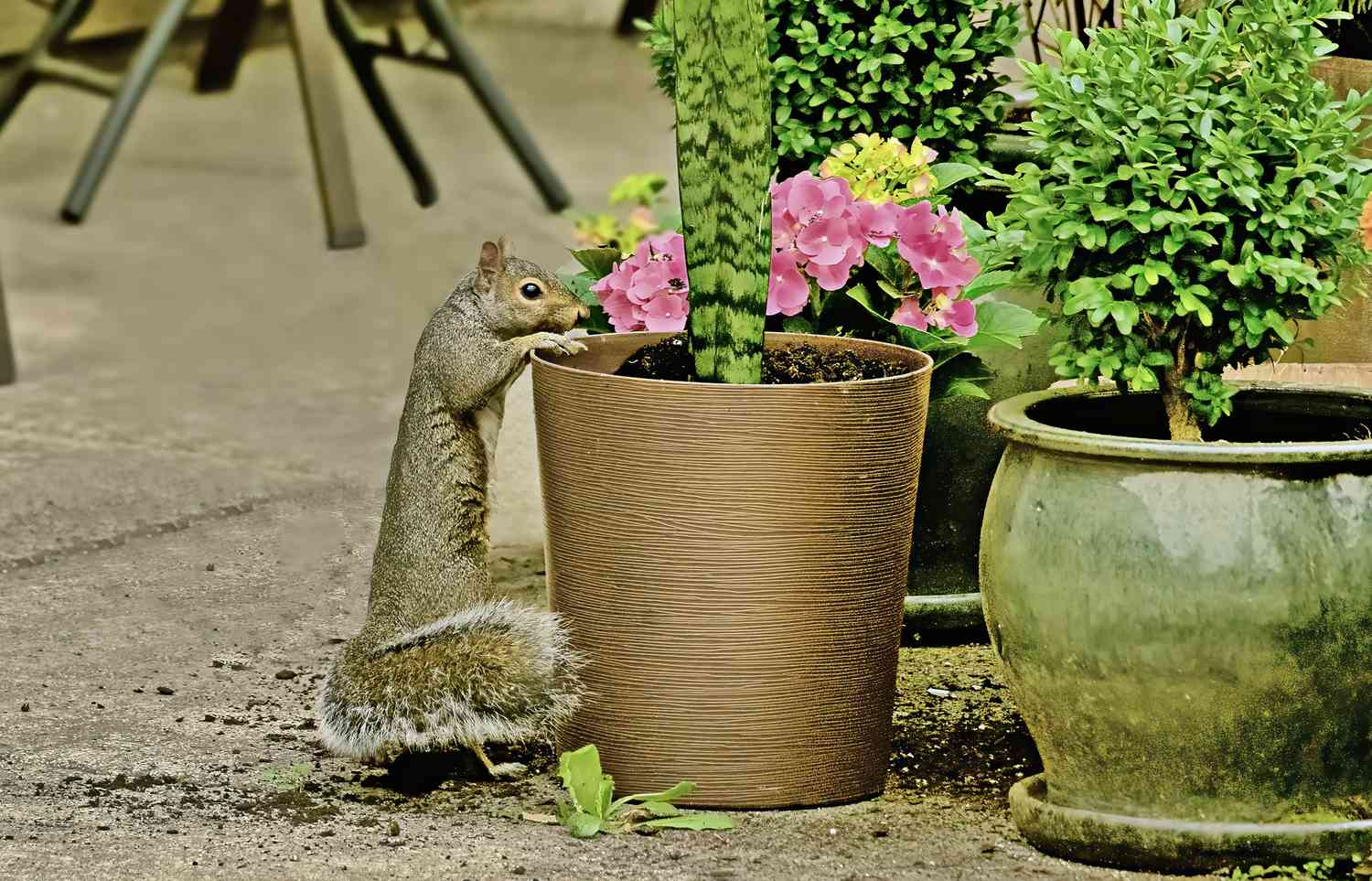
II. Implementing Physical Barriers and Exclusion Methods
A. Utilizing Protective Netting and Mesh
One effective method for deterring squirrels from accessing potted plants involves the use of protective netting and mesh. These durable materials are draped over pots or secured as barriers around the container garden to prevent squirrel intrusion. Properly installed netting and mesh provide practical and humane protection, ensuring that plants are shielded from potential squirrel damage while allowing for adequate airflow and sunlight.
B. Applying Metal Guards and Enclosures to Secure Potted Plants
In addition to netting and mesh, metal guards and enclosures offer another layer of defense against squirrel activity. These sturdy barriers effectively deter squirrels from accessing potted plants, ensuring that containers are securely shielded from potential damage. The durable construction and strategic placement of metal guards and enclosures are essential for safeguarding the integrity of container gardens.
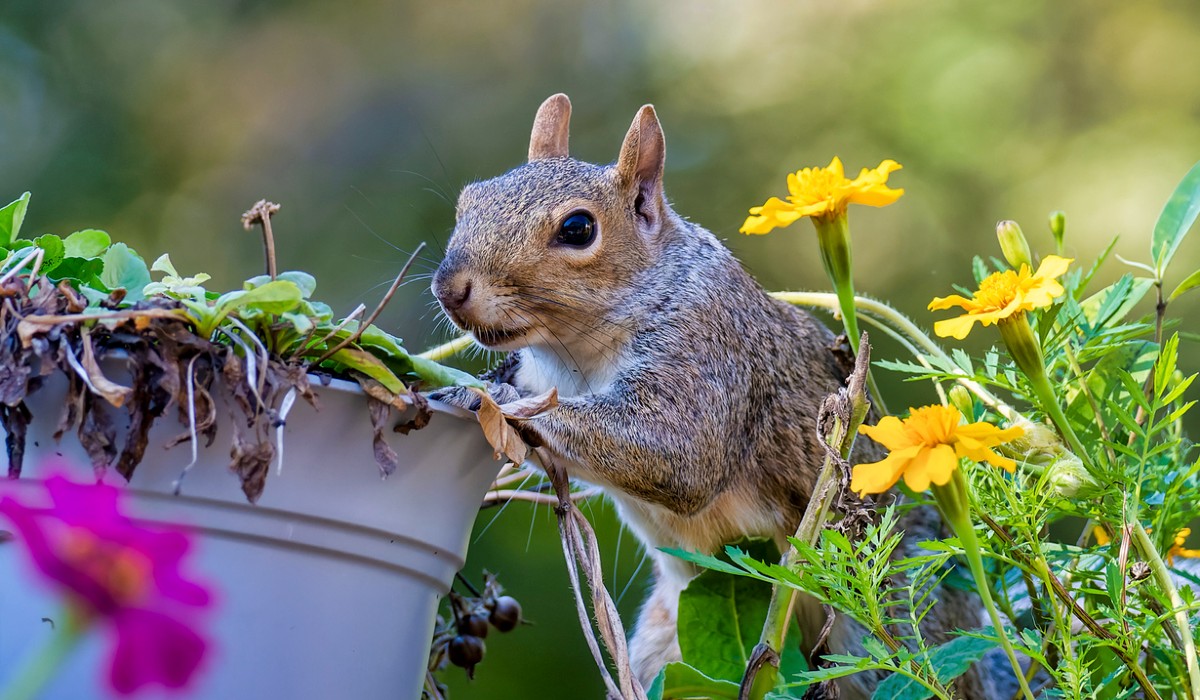
III. Natural and Home Remedies for Squirrel Deterrence
A. Employing Scent-Based Deterrents to Discourage Squirrel Intrusion
Natural repellents, such as predator urine or strong-smelling substances like cayenne pepper, can create an olfactory deterrent effect, discouraging squirrels from approaching flower pots. By applying these scents around the garden area, gardeners can effectively deter squirrel intrusion while ensuring the ethical treatment of wildlife.
B. Enhancing Plant Borders with Spiny or Unpleasant Substances
Creating an unwelcoming environment for squirrels can be achieved by bordering flower pots with rough or spiky textures such as gravel, mulch, or prickly plants. These unpleasant substances serve as physical barriers, deterring squirrels from approaching and potentially damaging potted plants. Careful selection and application of these materials are essential to creating effective deterrents.
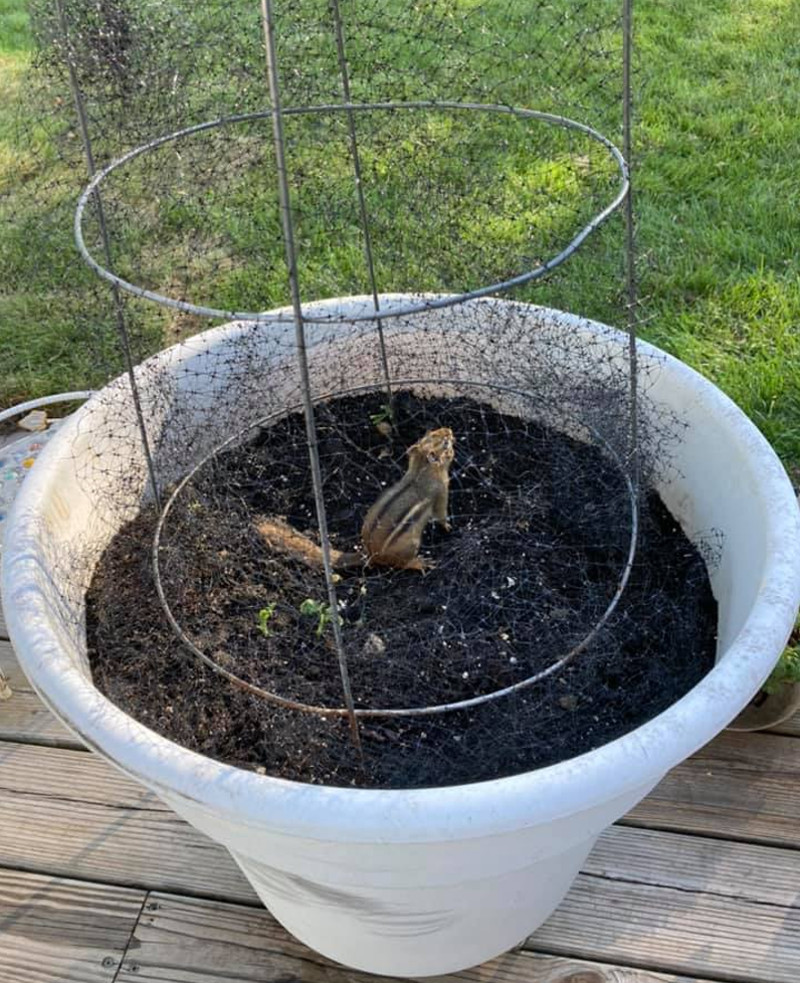
IV. Implementing Visual and Auditory Deterrents
A. Utilizing Motion-Activated Devices to Startle and Deter Squirrels
Motion-activated sprinklers, lights, or auditory deterrents offer a non-harmful yet effective means of deterring squirrels from approaching potted plants. These devices startle squirrels, encouraging them to avoid the garden area, while providing an ethical and humane method for protecting container gardens.
B. Incorporating Visual Distractions and Scare Tactics for Squirrel Deterrence
Visual deterrents, such as reflective objects, hanging CD disks, or scarecrow-like items, disrupt squirrel activity, creating an unappealing environment that encourages them to avoid the area. Carefully placing and rotating visual deterrents is essential for maintaining their effectiveness and promoting ethical squirrel deterrence practices.
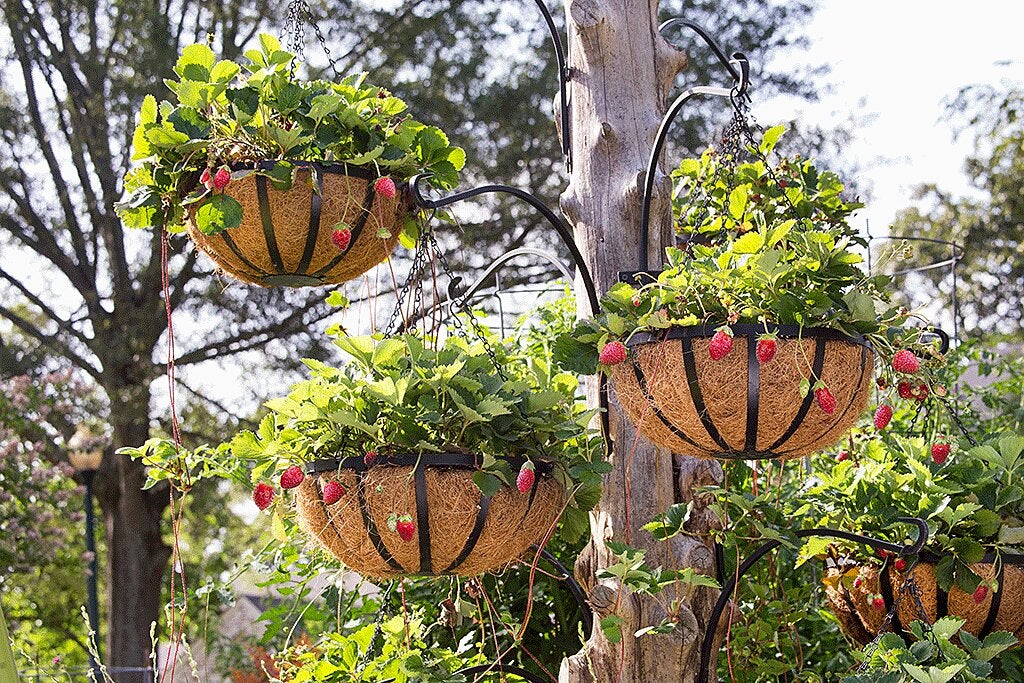
V. Creating a Squirrel-Friendly Distraction Area
A. Establishing a Separate Feeding Station to Divert Squirrels’ Attention
Providing an alternative feeding location, such as a designated squirrel feeder, diverts the attention of squirrels away from flower pots to a suitable feeding area. Strategically placing and maintaining squirrel feeders help redirect squirrel behavior away from container gardens, fostering ethical practices and coexistence with wildlife.
B. Implementing Squirrel-Friendly Plantings Away from Main Container Gardens
Strategically integrating specific plants or flowers that are appealing to squirrels away from the main container garden creates a designated area that encourages squirrel activity without posing a risk to potted plants. Carefully chosen squirrel-friendly plantings redirect squirrel behavior, promoting ethical and humane wildlife management in container gardening.
VI. Monitoring and Adapting Deterrence Strategies
A. Assessing the Effectiveness of Implemented Squirrel Deterrence Techniques
Regular assessment and observation are critical to evaluating the effectiveness of implemented squirrel deterrence methods. Monitoring signs of squirrel presence or damage provides valuable insights into the success of these techniques, guiding the ongoing protection of container gardens.
B. Adaptation and Refinement of Deterrence Practices Based on Squirrel Behavior
Flexibility and adaptability in adjusting squirrel deterrence strategies based on the observed behaviors and responses of squirrels are essential for maintaining effective protection of potted plants. Continuously refining deterrence practices ensures that container gardens remain safeguarded from potential damage while promoting ethical and humane wildlife management.
In conclusion, safeguarding container gardens from potential damage caused by squirrels requires a combination of proactive measures and adaptable strategies. By implementing a range of effective squirrel deterrence techniques, gardeners can protect their container gardens while promoting ethical and humane wildlife management. Regular monitoring and adaptation of these methods are crucial for maintaining their effectiveness and ensuring sustained protection for container gardens. Through thoughtful consideration and application of squirrel deterrence strategies, gardeners can create a harmonious and flourishing environment for their plants, free from the unwelcome intrusions of squirrels.
Overall, these effective squirrel deterrence techniques provide ethical and humane protection for container gardens while fostering coexistence and harmony with wildlife in an outdoor environment.
